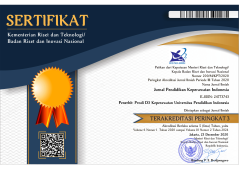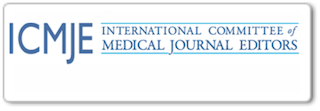A Literature Review: Pengaruh Cognitive Therapy Terhadap Post Traumatic Stress Disorder Akibat Kekerasan pada Anak
Abstract
ABSTRAK
Studi literatur review ini dilatarbelakangi adanya fenomena empirik yang menggambarkan kejadian tindakan kekerasan pada anak yang semakin serius dari waktu ke waktu. Implikasi tindakan kekerasan berdampak pada perlukaan fisik, gangguan mental, sosial, spiritual bahkan sering menimbulkan kematian. Literatur ini ditunjukan untuk menganalisis secara teoritik pengaruh Cognitive Behavior Therapy (CBT) terhadap Posttraumatic Stress Disorder (PTSD) akibat kekerasan pada anak. Metode kajian literatur dilakukan terhadap tujuh artikel yang diperoleh dari sejumlah tiga database, EBSCO, PubMed, dan Springer Link. Kata kunci untuk pencarian artikel adalah “posttraumatic stress disorder”, “child abuse”, “cognitive behavior therapy”, dan “treatment” dengan “AND” sebagai Boolean operator. Hasil dari kajian literatur yaitu bahwa CBT memiliki pengaruh terhadap PTSD akibat kekerasan pada anak. Hasil artikel review berupa: 1) Perbaikan klinis; 2) Menurunkan masalah PTSD; 3) Menurunkan kecemasan; 4) Menurunkan komorbiditas; dan 5) Kurangnya perbaikan pada kelompok tunggu. Hasil kajian literatur tersebut membuktikan adanya penurunan nilai rata-rata PTSD dari waktu ke waktu pada anak. Kesimpulan dari kajian literatur adalah CBT berpengaruh terhadap PTSD akibat kekerasan pada anak. Rekomendasi kajian literatur ini dapat menjadikan CBT sebagai terapi alternatif yang digunakan pada anak dengan masalah PTSD.
ABSTRACT
The background of this literature review study is the emergence of empirical phenomena in the form of incidents of violence to children, child abuse who become more serious from time to time. The violence to children, child abuse implications have an impact on physical injury, mental disorder, social, spiritual and often even lead to death. Literature review study purposed to look at the effects of Cognitive Behavior Therapy (CBT) for the handling of Posttraumatic Stress Disorder (PTSD) as a result of child abuse. A keywords literature review focused on seven articles was obtained from three databases, EBSCO, PubMed, and Springer Link. Keywords to search the article is "posttraumatic stress disorder", "child abuse", "cognitive behavior therapy" and "treatment" with "AND" as Boolean operators. The results of the literature review are the CBT has an influence on PTSD as a result of child abuse. CBT influence on PTSD found that 1) The clinical improvement; 2) Reduce problems of PTSD; 3) Reduce anxiety; 4) Lower comorbidity, and 5) lack of improvement in the waiting group. The results of the literature review prove decrease in the average value PTSD over time in children. Conclusions from the study of literature, CBT affect the handling of PTSD as a result of child abuse with the results that have been obtained from the literature review. The results of the literature review can make CBT as an alternative therapy for children with PTSD issues.
Keywords
Full Text:
PDFReferences
American Psychiatric Association (APA). (2013). Diagnostic and statistical manual of mental disorder: DSM-5 (ed.5). Arlington, VA: American Psychiatric Association
Aveyard, H. (2014). Doing literature review in health and social care: A practical guide (ed.3). New York: McGraw-Hill Companie
Beck, Judith S. (2011). Cognitive behavior therapy: basics and beyond (ed.2). New
York: The Guilford Press
Bruns, C. (2010). Empirical research: How to recognize and locate. Fullerton: California Stage University. Diakses pada 15 April 2019 dari http://users.library.fullerton.edu/cbruns/empirical_research.htm
Child Welfare Information Gateway (CWIG). (2013). What is child abuse and neglect? Recognizing the signs and symptoms. Washington, DC: U.S. Department of Health and Human Services, Children’s Bureau. Diakses pada 15 April 2019 dari https://www.childwelfare.gov/pubpdfs/whatiscan.pdf
Deblinger, E., Mannarino, A. P., Cohen, J. A., Runyon, M. K., & Steer, R. A. (2011).
Trauma-focused cognitive behavioral therapy for children: impact of the trauma narrative and treatment length. Depression & Anxiety (1091-4269), 28(1), 67-75. doi:10.1002/da.20744
Diehle, J., Opmeer, B. C., Boer, F., A. P. Mannarino., & Lindauer, R. J. L. (2015). Trauma-focused cognitive behavioral therapy or eye movement desensitization and reprocessing : what works in children withposttraumatic stress symptoms ? A randomized controlled trial. Diakses 15 April 2019 dari Eur Child Adolesc Psychiatry, 227–236. http://doi.org/10.1007/s00787-014-0572-5
Dorsey, S., Pullmann, M. D., Berliner, L., Koschmann, E., McKay, M., & Deblinger, E. (2014). Engaging foster parents in treatment: a randomized trial of supplementing trauma-focused cognitive behavioral therapy with evidence-based engagement strategies. Child Abuse Negl, 38(9): 1508– 1520.doi:10.1016/j.chiabu.2014.03.020
Endaryono. (2017). Dampak Kekerasan Terhadap Anak (Pahami, ambil sikap dan action). Diakses 15 April 2019 dari https://perludiketahui.wordpress.com/dampak- kekerasan-terhadap-anak/[26-9-2017; 10:46]
Kawulusan, Bovie (2018). Analisis Kekerasan terhadap Anak di Provinsi Lampung. Diakses 13 April 2019 dari https://boviekawulusan.blogspot.com/2018/03/analisis-kekerasan-terhadap-anak- di.html
Komisi Nasional Hak Asasi Manusia (Komnas HAM). (2014). Data prilaku Kekerasan pada anak dan Kejahatan seksual terhadap anak. Suar, 1, 13. Diakses pada 13 April 2019 dari http://www.komnasham.go.id/sites/default/files/dokumen/SUAR%20EDIS
I%201-2014.pdf
Mohammadi, M. R., Zarafshan, H., & Khaleghi, A. (2014). Child abuse in iran: A systematic review and meta-analysis. Iranian Journal of Psychiatry, 9(3), 118-124. Diakses pada 13 April 2019 dari https://www.ncbi.nlm.nih.gov/pmc/articles/PMC4277799, PMID: 25561950
National Center for PTSD. (2015). Ptsd in children and teens. U.S. Department Veterans of Affairs. Diakses pada 13 April 2019 dari http://www.ptsd.va.gov/public/family/ptsd-children-adolescents.asp
Prasetyo, Yehezkiel E. (2016). pengaruh cognitive behavior therapy terhadap penanganan posttraumatic stress disorderakibat kekerasan pada anak. Laporan Tugas akhir 2016
Nixon, R. D. V., Sterk, J., & Pearce, A. (2012). A randomized trial of cognitive behaviour therapy and cognitive therapy for children with posttraumatic stress disorder following single-incident trauma. Journal of Abnormal Child Psychology, 40(3), 327– 337. http://doi.org/10.1007/s10802-011-9566-7
Randolph, J. J. (2009). A giude to writing the dissertation literature review. peer- reviewed electronic journal, 14(13). Diakses pada 15 April 2019 dari http://doi.org/10.1306/D426958A-2B26-11D7-8648000102C1865D
Salloum, A., Robst, J., Scheeringa, M. S., Cohen, J. A., Wang, W., Murphy, T. K., Tolin, D. F., & Storch, E. A. (2014). Step one within stepped care trauma-focused cognitive behavioral therapy for young children: A pilot study. Child Psychiatry Hum Dev, 65–77. Diakses pada 15 April 2019 dari http://doi.org/10.1007/s10578- 013-0378-6
Scheeringa, M. S., Weems, C. F., Cohen, J. A., Amaya-Jackson, L., & Guthrie, D. (2011). Trauma-focused cognitive-behavioral therapy for posttraumatic stress disorder in three-through six year-old children: a randomized clinical trial. Journal of Child Psychology & Psychiatry, 52(8), 853-860. doi:10.1111/j.1469- 7610.2010.02354.x
USC University of Southern California. (2016). Organizing your social sciences research paper: Limitations of the study. Diakses pada 15 April 2019 dari http://libguides.usc.edu/writingguide/limitations
Webb, C., Hayes, A., Grasso, D., Laurenceau, P., & Deblinger, E. (2014). Trauma- focused cognitive behavioral therapy for youth: effectiveness in a community setting. Psycho Trauma, 6(5): 555–562 doi:10.1037/a0037364.
World Health Organization (WHO). (2014). Child maltreatment. Diakeses pada 13 April 2019 dari http://www.who.int/mediacentre/factsheets/fs150/en/
. (2016). Global health observatory (GHO) data: Prevalence of fatal and non- fatal violence. Diakeses pada dari 13 April 2019 dari http://www.who.int/gho/violence/prevalence_text/en/
DOI: https://doi.org/10.17509/jpki.v5i2.17429
Refbacks
- There are currently no refbacks.
Jurnal Pendidikan Keperawatan Indonesia(JPKI) published by Indonesia University of Education. JPKI is licensed under a Creative Commons Attribution-ShareAlike 4.0 International License.
Office :
Nursing Department. FPOK UPI.
229, Dr. Setiabudhi Street. Bandung 40154
West Java , Indonesia
E-mail : jpki@upi.edu

_.png)
_.png)
_.png)











